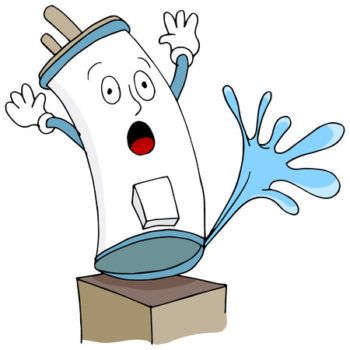As the nights grow longer and the days ever so slightly cooler, we look forward to the warmth and coziness our homes provide. A hot shower in the morning or a soothing bath at the end of the day are creature comforts we often take for granted. They rely on an essential element: a working hot water heater. If you have concerns about the longevity of your hot water heater, our plumbers have some suggestions for you. You definitely don’t want to get left out in the cold, but if all is well, you might find other uses for the money you’d spend on a replacement, especially as the holiday season kicks into high gear.
Get Rid of Golden Oldies?
The average lifespan of a traditional tank hot water heater is 10-15 years. If you’ve given yours a lot of TLC (flushing it once a year, replacing the anode rods every few years), you might be able to make it last longer, but if you’re over the ten-year mark, you might decide you’re better safe than sorry. At the very least, we recommend you start researching new models, so that you’re not caught having to make an important, expensive decision on very little notice.
Move to More Efficiency?
If you’re making this decision purely from a financial standpoint, don’t forget to take energy efficiency into account. The older your model, the less efficient it is at doing its job and the more energy it uses to heat your water, which means a higher utility bill. Replacing an aging water heater with a new one of the same style will save you some money in the long run, but if you’d really like to cut down on energy use, consider going with a tankless or solar powered model or a circulatory pump. Your Buda TX plumber can walk you through the advantages of various models and help you choose the one that fits your lifestyle and budget.
Ready to Relocate?
If your current water heater takes a dramatic turn for the worse, how bad is the damage likely to be? If it’s located in a garage or near a drain, consider yourself lucky. However, if it’s in a central part of your home (or even worse, on an upper floor), coming home to a leak could really cost you. Think about how much risk you’re willing to take, and give your water heater a good once-over to check for rust or corrosion — these, as well as rumbling or banging noises, are sure signs that you’re in need of a new heater. If you notice a leak, immediately turn off the power and water and call your residential plumber as soon as possible.
The Bottom Line
If your water heater is rusting, noisy, or leaking, it’s definitely time to replace it. Ditto if it’s old and hasn’t been well-maintained or if it’s located in a spot that could cause high dollar damage when it does break down. And if you’re looking to lower energy usage, upgrading to a more efficient model is the way to go. But if you’re under the ten-year mark and haven’t noticed visible signs of damage, there’s no reason to replace it. We do recommend inviting your residential plumber out for a maintenance visit, to make sure everything is working smoothly and to keep you in hot showers all winter long.


